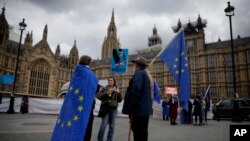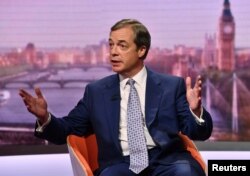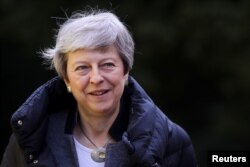It is an election Britain was never meant to be holding — the country was scheduled to have left the European Union by now.
A postponement of Brexit, Britain's departure from the EU for further negotiations has left it having to hold elections on May 23 for the European Parliament, and the result is likely to mark another stage in the erosion of the country's traditional two-party political system.
Both of Britain's main parties — the Conservatives and Labour — are struggling to come up with coherent messages for the elections and are being buffeted by internal infighting.
The Conservatives have all but given up campaigning as dozens of local party chair persons and hundreds of grassroots activists have shunned the elections and offered no help. The Conservative Party is also running out of money with big donors withholding their normal funding.
The Conservative grassroots revolt against Prime Minister Theresa May's Brexit policy is opening the door for a likely stunning performance at the polls by Nigel Farage's newly-minted Brexit Party. Founded in January, the party could well top the polls with the ruling Conservatives facing the humiliation of a virtual wipeout.
The Conservatives are doing little campaigning on social media and have bought no Facebook ads for the election. The party's official Facebook page doesn't even mention the elections and the prime minister herself won't be out on the stump trying to drum up support.
Smaller parties in play
Opinion polls are broadly finding voters are turning against the two main parties and toward smaller parties that either back leaving the European Union or want to remain in the bloc. With the smaller pro-Remain parties, Liberal Democrats, Greens and Change UK, competing against each other, the Brexit Party has the edge.
One poll on Sunday forecast that Farage's party could end up with a bigger share of the vote than the combined support for the Conservatives and Labour.
Farage has been campaigning for an immediate no-deal Brexit that would see Britain cut ties with the European Union without a trade deal in place, regardless of the economic or political consequences for Britain, including Scotland opting for independence.
He's accusing the Conservatives of engaging in a "great Brexit betrayal."
"There is a massive appetite for the Brexit Party right now because people want to live in a democratic country," according to Farage. "We have been betrayed not just by the Conservatives; Labour has done the same thing too. Our policy is to leave with a clear-break Brexit and get on with the rest of our lives," he says.
A poll published in The Times newspaper suggests the Conservatives could come in fifth place, behind the Greens and the Liberal Democrats, attracting just 10% of the vote.
"I don't think anyone's in any doubt these are going to be difficult elections for us," Damian Hinds, the education minister in Prime Minister May's Cabinet, told the BBC Sunday. "For some people this is the ultimate protest vote," he said. He said for some people, the election is being seen as almost a second referendum on whether to leave the EU.
May's failures
If Prime Minister May had managed to persuade a majority parliament to back a withdrawal deal she negotiated after two years of ill-tempered talks, Britain wouldn't be holding the May 23 elections. The country was due to leave the bloc on March 29, but now has a new departure date of October 31, although that date could be pushed back, too.
May has failed three times to get her Brexit deal passed by MPs.
For the Euro election, Britain is divided into a dozen regional constituencies, and will return 73 MEPs to the European Parliament.
Labour, which is running second in the polls, is also being tested by the elections.
Party leader Jeremy Corbyn, a longtime critic of the EU, has shied away from committing to a second Brexit referendum — to the fury of a majority of his lawmakers, who believe a second vote on EU membership would overturn the June 2016 plebiscite, in which a thin majority voted for Brexit.
The Conservatives and Labour are engaged in cross-party negotiations to try to break the Brexit deadlock in the House of Commons and come up with a new Brexit deal.
Labour is proposing Britain remaining in a customs union with the EU, a position that's anathema to the hardline Brexiters, nicknamed the "Spartans," in May's party, but doesn't go far enough to satisfy the nearly three out of four Labour Party members who are pro-EU. Corbyn's aides say he's trying to ensure the support of the third of Labour supporters who favor Brexit.
Some analysts suggest a dismal showing for both of Britain's main parties could lead to them to redouble their efforts to come up with a Brexit deal that can get through the House of Commons.










